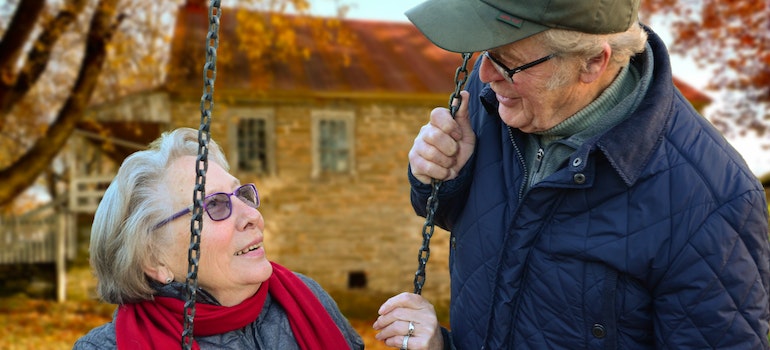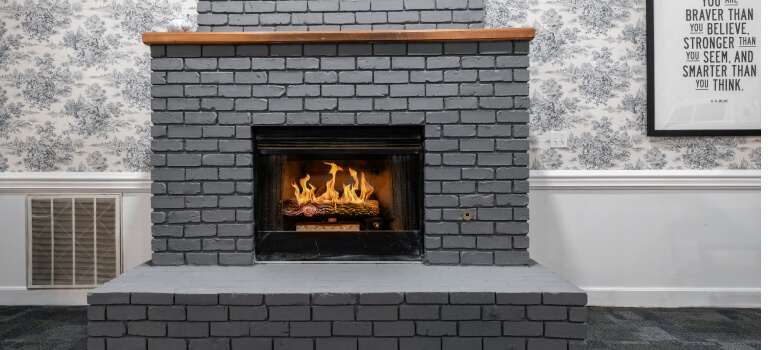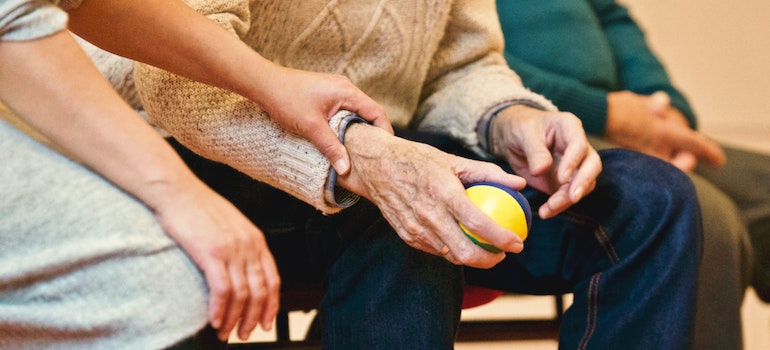Drug Rehab for Seniors
Embrace a new chapter of healing and growth with senior rehab at Harmony Ridge Recovery Center. It's never too late to reclaim your life and find renewed purpose.
Addiction doesn’t have an age limit. You can develop a substance abuse problem at any point in your life. The good news is that you can also recover from a substance abuse problem at any point in your life. So if you’re thinking that it’s too late and rehab for seniors is not worth it, think again. You can enjoy the rest of your retirement sober – in good health, financially stable, and surrounded by family who loves you instead of sacrificing all that to drugs and alcohol. Harmony Ridge Recovery Center will help you achieve that. Contact us whenever you’re ready to seek help and we will get you started on the journey toward recovery.
Substance abuse among the senior population
Excessive drinking and drug use are typically associated either with youthful experimentation or criminality, not with the elderly. There is a reason for that – statistically speaking, substance abuse is less common in the population over the age of 65 than in any other demographic. However, that doesn’t mean that nobody needs drug and alcohol rehab for seniors. In fact, almost a million older adults need drug addiction treatment WV annually. What is more, substance abuse among the elderly is on the rise. Since 2010, the percentage of seniors in rehab has more than doubled. Unfortunately, very few addiction prevention and treatment programs are geared specifically toward adults over 65, which makes receiving adequate help difficult.

Most commonly abused substances
The elderly can abuse all the same substances as anyone else, including illicit drugs. However, recent statistical data shows that most people enroll in rehab for seniors for addiction to:
- alcohol (the leading cause of addiction among older adults)
- nicotine (used by almost 10% of the elderly population, although not always to the point of addiction)
- prescription medication (abused accidentally or intentionally)
- opioids (in particular, pain medication)
Reasons for substance abuse in seniors
The three main reasons for substance abuse in adults over 65 appear to be stress, habit, and mental health issues. Like people in other age groups, some seniors find it hard to deal with major life changes like retirement, loss of loved ones, and declining health. However, once they’ve started abusing drugs or alcohol, they often find it harder to stop than younger demographics. This is especially true of the elderly who drink and smoke and have done so for a long time; they typically struggle with finding the motivation to break a hard and fast habit so late in life.
However, it’s also quite common for addictions in the elderly to form unintentionally. As we age, our health declines and we often find ourselves needing medication to maintain an acceptable baseline level of well-being. Often, this medication includes highly addictive opioids. But even when it doesn’t, older adults sometimes struggle to keep track of their prescription medication intake. They may unintentionally take higher doses than prescribed, which leads to dependency and eventually addiction.
Rehab for seniors at Harmony Ridge Recovery Center to help you enjoy the rest of your life sober
Substances affect senior bodies differently than other adults. At this stage in your life, you are already physically weaker so drinking, smoking, and doing drugs can severely impact your health. Overdose is also more likely as your body can only tolerate so much of any given substance. So continuing to abuse substances is a risk to your health and even life. Addiction recovery, on the other hand, can give you more quality time to spend with your loved ones or simply enjoy your life.
The benefits of specialized rehab for seniors

The elderly face different physical and mental health challenges from the rest of the population. Many feel they’ve lost their purpose after retiring, battle grief over dead friends and loved ones, and struggle with facing their own mortality. Drug and alcohol rehab for seniors will address all these unique issues in specialized addiction therapy. Medical personnel will also be on hand to deal with the medical complexities of addiction in seniors, manage your medications, and keep you physically fit and healthy through a diet and exercise plan suited to your age. If needed, we can also make accommodations for disabilities that allow you to comfortably and easily access every part of our facility during treatment.
Our rehab for seniors adopts a holistic approach to addiction treatment
Addiction treatment for seniors must be targeted and specific. The goal is to give you the skills and confidence to manage your own sobriety so that you can go back to living your life, not to rob you of more time by keeping you in a treatment facility. To achieve this goal, we approach addiction treatment holistically, addressing every aspect of addiction for the purpose of full recovery.
Rehab for all types of substance abuse
Although some addictions are more common among the elderly, none are impossible. To help everyone over the age of 65 who struggles with substance abuse, our rehab for seniors provides treatment for all the common variations of substance abuse disorder. At our facility, you can access:
- alcohol rehab WV
- cocaine addiction rehab
- fentanyl detox treatment
- heroin rehab centers
- Ambien rehab
- barbiturates rehab
- benzo rehab
- marijuana rehab center
- stimulants addiction rehab center
- opiate rehab center
- meth rehab center West Virginia
Safe detox and medication-assisted treatment
Detoxing from certain substances can be uncomfortable and even dangerous even for young, fit people. It is significantly riskier for the elderly. The strain that withdrawal puts on your heart and lungs in particular can be too much if you already have health issues related to the same organs. For this reason, it is highly recommended that you do not detox on your own. Instead, do so in our alcohol rehab for seniors where you will be under medical supervision and have access to medication assisted treatment. You will be much safer and more comfortable quitting drugs or alcohol while in our care.
Effective addiction therapy
Specialized therapy is a key component of rehab for seniors. It will help you find the motivation to quit and learn the skills to cope with everyday stress without turning to substances. Furthermore, it will address any other mental health issues you may have, including underlying disorders like depression, trauma, and anxiety.

You’ll have plenty of time to discuss these problems in:
- individual therapy for addiction where you will work one-on-one with a therapist
- group therapy for addiction where you can learn from your peers under the guidance of a licensed counselor
- family therapy for addiction where you can repair and strengthen bonds with your family members
Enjoy a pleasant recovery in a beautiful location and a supportive community at Harmony Ridge
Our addiction treatment facility in West Virginia is a comfortable, homey place surrounded by more than 50 acres of beautiful nature and staffed by caring and compassionate professionals. We foster a welcoming and supportive atmosphere where you can ask for help freely, make connections with your peers, and find the motivation to fight for a better future. Our goal is to run a rehab and medical detox center that inspires you to leave addiction behind and facilitates healing to give you the best possible chance at long-term recovery.
It is never too late to get sober - contact us today to start your treatment in rehab for seniors!
No matter how old you are or how long you’ve been struggling with addiction, recovery is always possible. Moreover, it is always worth the effort. You could improve your physical and mental health and add years to your life by leaving addiction behind. And our rehab for seniors is designed specifically to make that happen. So contact us today if you are ready to start treatment – the door to the Harmony Ridge Recovery Center is always open!
FAQ
1. How common is addiction among senior citizens?
Adults over the age of 65 are the least likely of all age groups to suffer from substance abuse disorder. Addiction typically begins in early adulthood; most people who develop serious issues with substance abuse either get help and recover before they become seniors or don’t live to be seniors at all. However, there are still about a million seniors in the US who need rehab every year and that number is on the rise.
2. What are the specific concerns regarding substance abuse among seniors?
Substances affect aging bodies differently from regular adult bodies. They may have stronger or faster effects at the moment and may cause permanent damage more easily if health issues are already present in the user. This causes complex medical issues that are potentially fatal. Furthermore, certain mental health conditions associated with an advanced age such as dementia and Alzheimer’s can make therapy and rehab more difficult.
3. What are the most commonly abused substances among seniors?
Seniors typically abuse nicotine, alcohol, and prescription medication (benzos, Ambien, or opioids). This abuse may be intentional – to deal with issues like mortality, grief, and loneliness – or unintentional – developing an addiction by taking higher doses of medications than prescribed due to poor memory surrounding medication intake.
4. How does rehab for seniors differ from standard rehab?
In rehab for seniors, medical attention is given to the complicated health issues caused by the effect of substances on already frail organs and bodies and addiction therapy addresses issues that come with age, giving practical advice on dealing with emotions surrounding retirement, failing health, loss of partners and friends, and more.
5. Is rehab worth the effort at an advanced age?
Addiction treatment is always a worthwhile effort. Research shows that seniors who stop abusing substances are less likely to develop health issues early, are more likely to recover from illness, and can live up to three years longer. What is more, the therapy you receive in rehab can help you make those extra years worth living by mending relationships with family members, introducing you to friendly peers, and teaching you how to cope with life in better and more productive ways.
Jump To Section
Begin Your Journey to Healing Here
Ask me about recovery, I can help you!
Our recovery specialists are standing by 24/7 to help you or your loved one.
Or call us: 


